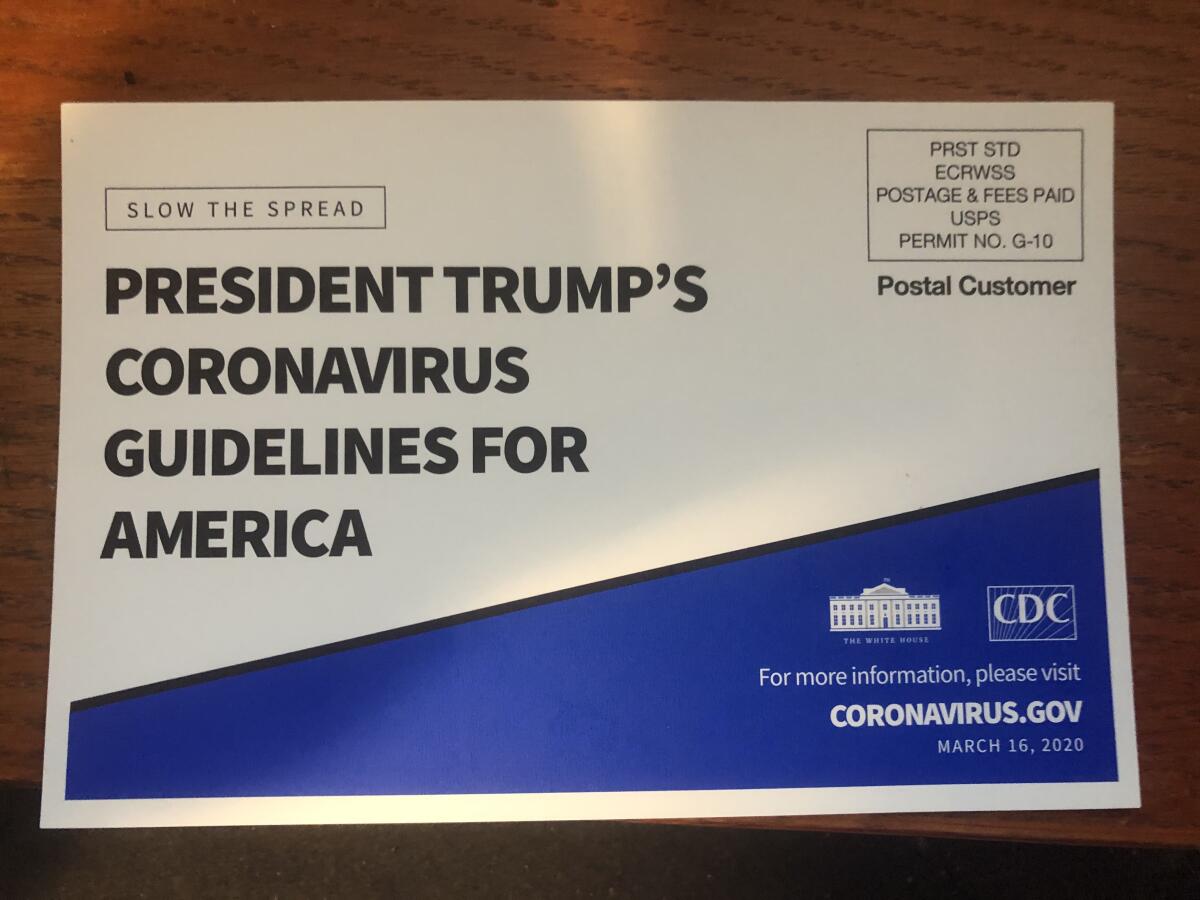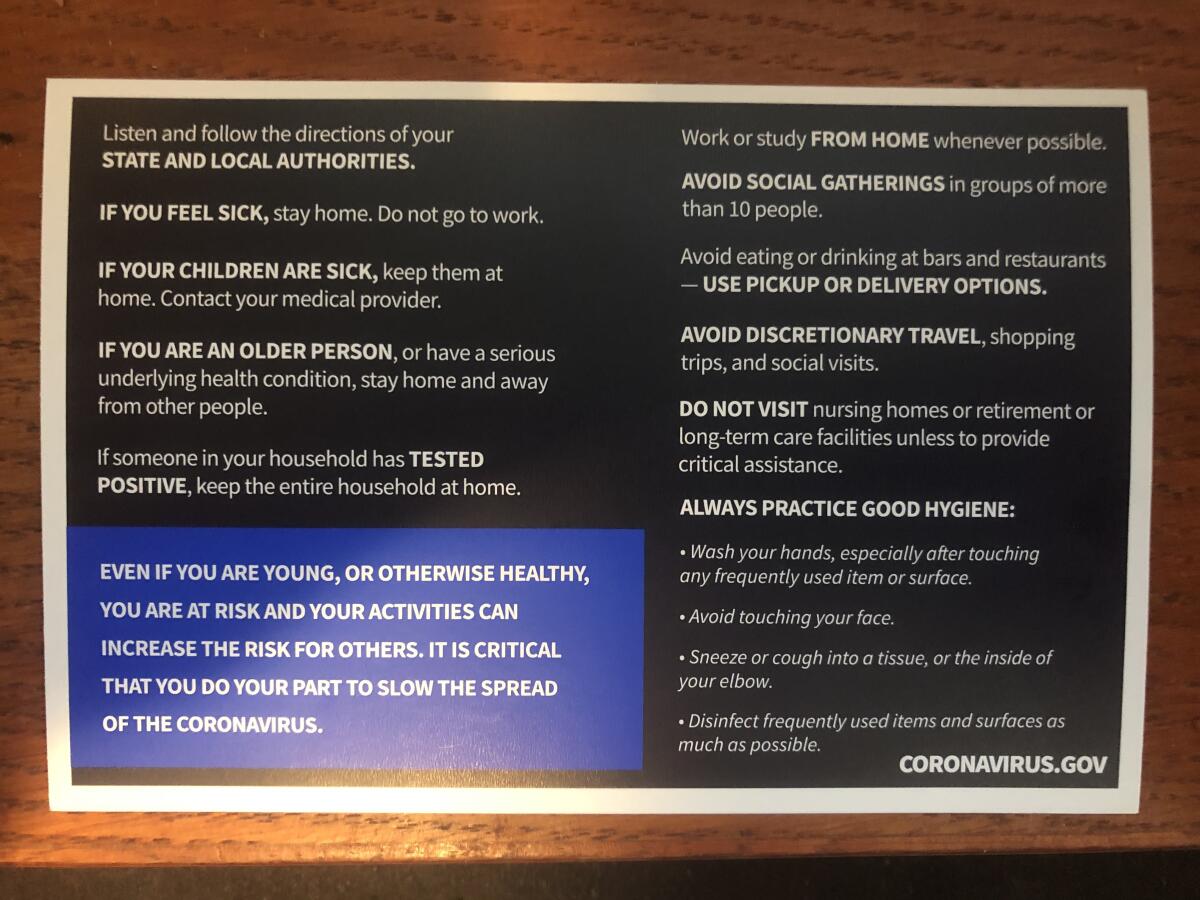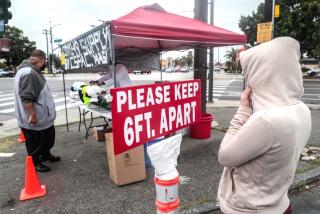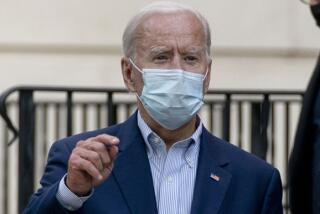Has Trump even read his own ‘Coronavirus Guidelines for America’?

- Share via
Like millions of other shut-in Americans, I received in the mail Tuesday a postcard-sized advisory on coronavirus practices purporting to come straight from the White House.
Labeled “President Trump’s Coronavirus Guidelines for America,” the postcard offers responsible advice. It counsels all Americans to stay home if they feel sick, keep away from others if you’re an older person or someone with a health condition, self-quarantine the entire household if someone in it has tested positive for the novel coronavirus, work or study from home wherever possible, and don’t eat or drink at bars and restaurants.
It also counsels “good hygiene”: Wash your hands frequently, avoid touching your face, sneeze into your elbow and so on.
Even if you are young, or otherwise healthy, you are at risk and your activities can increase the risk for others. It is critical that you do your part to slow the spread of the coronavirus.
— Centers for Disease Control and Prevention
What’s remarkable about the advisory, of course, is that contradicts what appears to be the developing Trump administration policy aimed at cutting the nation’s social distancing practices by Easter, or April 12. The card makes no mention of any such deadline posited by Trump, who seems intent more on saving the stock market than saving the millions of Americans whose health might be jeopardized by a premature relaxing of social distancing and self-quarantining practices.
Nor does it suggest, as have some conservatives with Trump’s ear, that younger people, ostensibly less vulnerable to the virus than their elders, can start going out and about

Indeed, the card carries a special bold-face, uppercase warning: “Even if you are young, or otherwise healthy, you are at risk and your activities can increase the risk for others. It is critical that you do your part to slow the spread of the coronavirus.”
Nor does the card make any mention of the therapeutic nostrums that Trump has promoted in his public briefings, such as chloroquine, an anti-malarial preparation that hasn’t been established as a coronavirus treatment.
Trump’s exaggerated claims for this treatment evidently prompted an Arizona husband and wife to ingest a related preparation for aquarium fish, with the result that the husband died and the wife landed on the critical list.
It’s perfectly appropriate for the government to issue sound advisories like those on this card, which bears the logos of the White House and the Centers for Disease Control and Prevention. The problem is that the mailing underscores the reckless inconsistency of the administration’s approach to the coronavirus pandemic.
President Trump, Elon Musk and other are spreading dangerous myths about coronavirus.
The postcard is dated March 16, just over a week ago. It’s a digest of advisories appearing on the CDC and White House websites. But there’s no reason to suppose that its advice is outdated today -- if anything, it’s more urgent.
Epidemiology experts stress that one of the imperatives in addressing a public health crisis like this one is that its message be forthright and consistent. The Trump administration’s is anything but.
The government’s own pandemic plan, issued in 2017, stressed the importance of “plain-language risk communication and prevention messaging.” Messaging would have to be “clear and consistent ... to the general public.”
The public must be “provided a solid foundation of relevant and usable information upon which people can base current and future actions....Success relies upon open, honest, transparent, and clear communications.”
The document also mentions the need to debunk “exaggerated product claims,” though it anticipated that these claims would come via the internet, not out of the mouth of the president of the United States.
It should be clear by now that the Trump administration’s response has violated every one of these rules -- not merely day-to-day, but sometimes within the same briefing, as when Trump’s scientific advisors from the CDC or the Food and Drug Administration have to step to the microphone to contradict some ignorant claim Trump has made.
This is no way to run a pandemic response. The postcard arriving in your mailbox today or over the next few days offers the right advice. You should heed it. As for the daily ruminations heard from President Trump, you should ignore them. That in itself is a sad commentary on the condition of the federal government.
More to Read
Inside the business of entertainment
The Wide Shot brings you news, analysis and insights on everything from streaming wars to production — and what it all means for the future.
You may occasionally receive promotional content from the Los Angeles Times.











